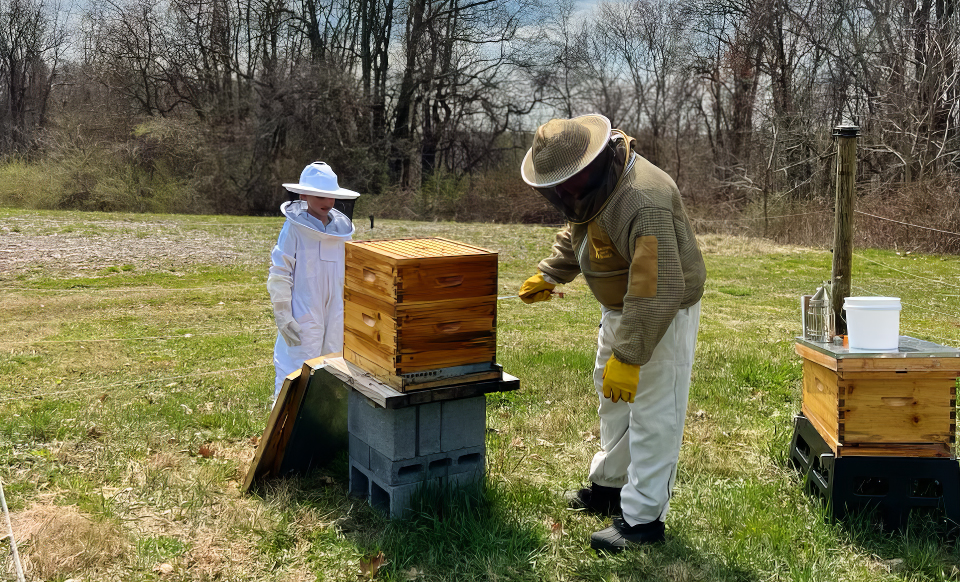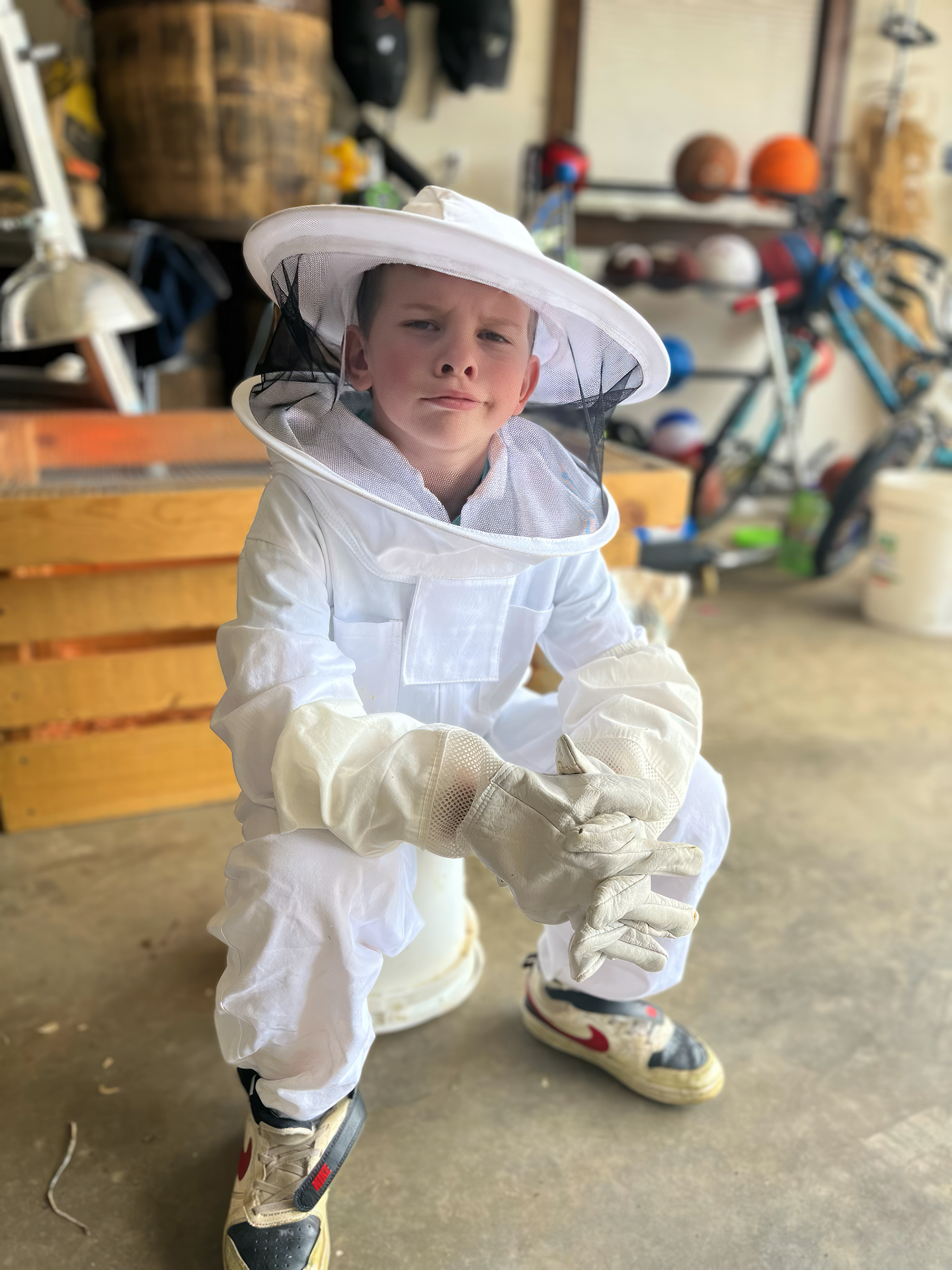
THE GREEN LIFE
What’s The Buzz? Beekeeping 101
by Bria Zegarelli
May 13, 2024
If you didn’t already know, World Bee Day is quickly coming up on May 20th. It’s a day that highlights the importance of bees’ role in our environment and what we can do to keep them safe. The UN’s website explains that this year in particular, the theme of World Bee Day 2024 is “Bee Engaged With Youth,” emphasizing that young people should get involved with beekeeping efforts in order to help the environment. In order to bring special attention to World Bee Day, beekeeping, and its connection to younger generations, I wanted to highlight both the beekeeping work of Renaissance Pittsburgh Hotel Executive Chef Nicholas Saxon as well as my own college’s efforts to emphasize beekeeping and the protection of bees.
Saxon is involved in beekeeping in his spare time and even has hives on his own property. Saxon graciously took the time to answer several questions about his beekeeping work, allowing me to understand much more about the world of beekeeping as well as his personal experience within the field.
B: What inspired you to begin beekeeping, and what was the process like for getting started?
N: We had an idea to be the first airport in the U.S. with beehives. So, while I was Executive Chef at the Pittsburgh Hyatt Regency (on airport grounds), we partnered with Burgh Bees and began the journey. I took a course and became a beekeeper. Stephen Reasky, the president [of Burgh Bees] at the time, shared his knowledge of the trade. He was great at his craft, and the staff and I learned so much from him.
B: What does your beekeeping setup look like?
N: I left the Hyatt about seven years ago to take a job as Executive Chef at the Renaissance Pittsburgh Hotel, which meant I had to leave the bees. I then decided after a couple of years of researching where to put the hive on my property. [After having] a good solar electric fence, I finally started driving a wood post to create a small apiary to keep honey bees. I currently have three hives and plan to continue to expand into more hives. I plan on being proactive and ready to capture the swarms this year, so I will set up a new hive. This is my third year having hives on my property.
B: What is the process of taking care of the hives and preparing to do so?
N: You need to inspect the hive about every couple weeks from early spring to winter, making sure the honeybees are doing what they need to. You look at the health of the hives, the nectar flow, capped honey (food source), and [whether] the queen is still laying larvae and the hive is strong with a good amount of bees.
B: How do you stay safe and also keep the bees safe?
N: [Wearing] protective bee suits and gloves. The bees have no reason to harm you unless you threaten them. It is an awesome experience when you have thousands of bees flying around you all performing a different duty for the hive along with coming and going with pollen and nectar from fields all over.
B: What is your favorite element of beekeeping?
N: My favorite element is getting my family and friends involved, educating people of this great species of nature, and producing a product locally made of the surrounding plants and flowers. I have three children. My youngest Dominic, who just turned nine, has shown the greatest fascination with the honey bees. He even suits up to go mow around the hives every week. He is curious about their way of life and how they strive to live.
B: What are Dominic’s favorite parts about beekeeping?
N: My son loves beekeeping. It is a chance for just him and I to bond over roughly 30,000 honey bees at each hive. He looks forward to taking more responsibility each time. He now will handle frames and thoroughly inspect the hive versus just holding the smoker and standing a couple feet from the hives.
B: Do you ever use any of the honey for your cooking?
N: I use the honey for cooking all the time. My wife loves to put a spoon in her hot tea. I like to bring the honey to different events to educate the public on local honey and how it and the honey bees benefit our crops and health. They are a major part of a plant’s life cycle [and] help build up immunity to seasonal outdoor allergies.
B: In celebration of World Bee Day, what are some fun facts about bees and hives?
N:
- Bees have been around over 30 million years.
- Bees fly about 20 mph.
- Each worker bee only produces about 1/12 tsp of honey in her lifetime. They live five to six weeks.
- Worker Bees in the hive are all females. The male bees, called drones, have no stingers.
- A worker bee has a barbed stinger, causing it to rip apart its lower body when stinging. It will eventually die right after.
- Honey is the only food that contains all nutrients to sustain life.

Beekeeping Initiative at Dickinson College
In honor of World Bee Day’s theme this year, I also looked into learning more about The Hive, which is Dickinson College’s beekeeping initiative. The Hive, which is managed by the Center for Sustainability and Education, features two European honey bee hives and teaches its members about beekeeping, honey production, bee habitats, pollination, community building, and sustainability through direct interaction with the bees and the hives. They also draw this learning outward by informing the campus community about these subjects as well. The Hive’s page on Dickinson’s website explains that the Hive members also “advocate for pollinator-friendly policies, build and improve native bee habitats on and off campus, and participate in educational programs on the significance of pollinators and the challenges facing them.” The Hive’s efforts are a great example of how college students can become more involved with learning about and experiencing the inner workings of the nature around them, and it allows students to have a better sense of sustainability because they are more connected to their environment. My friend Thea Duane works for the Hive, and I think her words really sum up students’ experience interacting with and learning about bees, as well as the importance of World Bee Day: “I love working with the Hive because every day presents a new challenge and learning opportunity. Bees have a remarkably complex social system that I can only hope to understand someday, and it is really a pleasure to work alongside such hardworking ladies. The bees, that is.”
This World Bee Day, say hi to all the bees around you, and thank them for all their hard work! They are essential parts of our environment, and I hope that this global event will allow people to understand how important bees are to our everyday life.

Leave A Comment